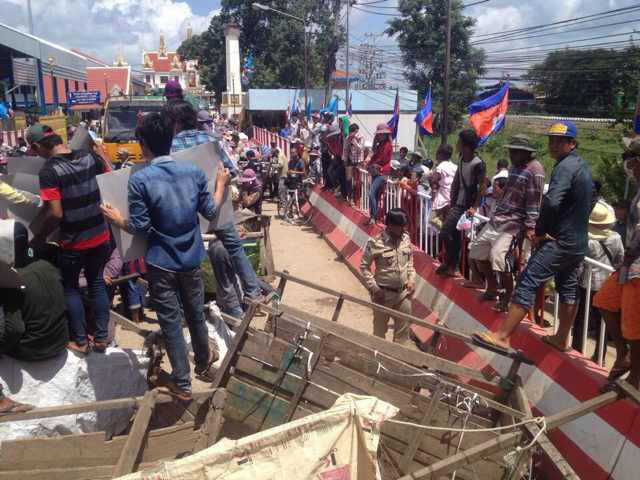Sixteen Cambodian border traders were imprisoned by the Thai military over the weekend after they were caught smuggling shoes and clothing illicitly bearing registered trademarks across the Poipet City border crossing on Saturday.
The traders, who supply the Rong Kluea border market in Thailand’s Sa Kaeo province, were arrested by the military after they and their 21 carts of secondhand clothes, within which the contraband was hidden, had cleared customs, said Poipet City Governor Ngor Mengchruon.

“The reason the Thai soldiers arrested our Cambodian cart workers was that they had hidden the goods, like trademarked shoes, inside secondhand clothing and put them in carts to sell them in the Thai market at the border,” he said.
Mr. Mengchruon said he did not know which brands or trademarks had been violated by the goods being smuggled into Thailand, but said the soldiers were working from a record book listing trademarks owned by Thai businesses.
Thai Seila, a vendor at Rong Kluea market, said Thailand’s military had been running a campaign against fake trademarks and branded items across the country’s markets since it seized power in a coup d’etat on May 22.
He said that in Sa Kaeo province, across the border from Poipet, the military has set up a second checkpoint to inspect goods being brought into the country.
“The Thai authorities have two checkpoints: One is the border checkpoint and one is checked by Thai soldiers,” Mr. Seila said.
Part of the Thai junta’s official justification for its removal of the country’s democratically elected government was to rid the government of endemic corruption.
In Poipet, Mr. Mengchruon said some other Cambodian traders staked out the border crossing in Poipet City on Saturday in order to protest and demand the immediate release of their 16 colleagues.
He said he thought the traders would be released today after fruitful negotiations with the soldiers, despite the crossing being closed briefly on Saturday due to the protest.
“We agreed with some points, between the Thai and Cambodian authorities, first that new clothes with legal trademarks and new clothes made in Cambodia will be allowed to enter Thailand—but no fake trademarks,” Mr. Mengchruon said.
“Secondhand clothes will also be allowed to enter to be sold in the Rong Kluea market. There’s no need to consider trademarks because they’re secondhand clothes,” he said.
However, both sides would now cooperate to prevent new clothes bearing fake trademarks from passing over the border, he added.
The Cambodian side said they wanted the traders freed Sunday, the governor explained, but bureaucracy on the Thai side was delaying the release until a weekday.
Mr. Seila, the vendor, said Sunday that the situation had calmed at the border market since the deal was struck, and that the number of vendors using the crossing had thinned.
“Today the situation at the border has calmed because carts carrying the secondhand clothes are not entering as before. It is not crowded at the border as before,” he said.
Under the deal struck between Mr. Mengchruon and the Thai soldiers over the weekend, a new market traders association will be formed and the crossing will remain open for an extra three hours for fish traders.
“The Thai-Cambodian authorities allowed the creation of a Rong Kluea market association for our market vendors to solve their problems with Thai customs or with other Thai companies involved with intellectual property,” he said.
The extra hours for fish trading, which will close at 5 p.m. instead of 2 p.m., will allow fishermen around Cambodia’s Tonle Sap more time to bring their produce to market, as most do not arrive at the border until about midday.



